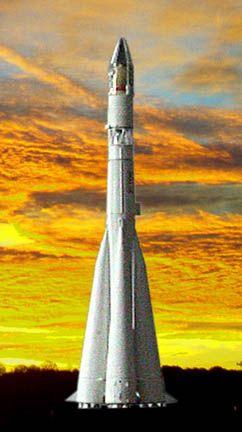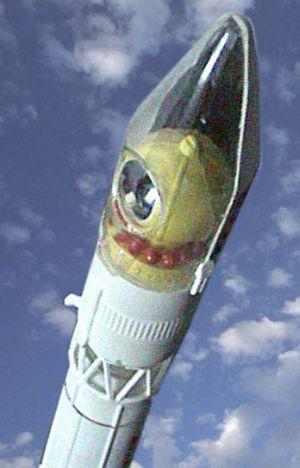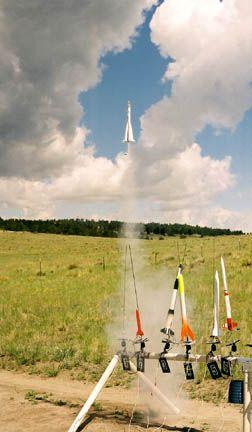| Construction Rating: | starstarstarstarstar_border |
| Flight Rating: | starstarstar_borderstar_borderstar_border |
| Overall Rating: | starstarstarstarstar_border |

Brief:
An OOP plastic scale model from the late 1960s and early 1970s which can be
built for flight or display, either as Vostok or Sputnik.
Construction:
Materials for flight: 19mm paper inner body tube, 18mm engine tube, engine
block, engine hook, clear plastic fins, shock cord, and 20 inch mylar
parachute.
There are approximately 30 styrene plastic parts for the static and flying options.
There are no special tools needed for this kit. The plastic parts glue together with plastic model cement and there are some optional pieces for flight versus display, such as 2 portions of body tube with launch lugs molded in and clear fins that are larger (although not obnoxiously so) than the scale fins. I used enamels in white, red, and yellow for the main rocket and small amounts of dark blue, tan, and brown for the cosmonaut.
The instructions are straightforward and contain well drawn exploded views (rather than the more-common multiple-step approach).
I'd give it a skill level of 2.
 There's one big gotcha
if you want to fly this: It is heavy with limited space for a parachute. The
main paper body tube is 19mm in diameter and only 9 inches in length. While an
attempt was made to stuff in the supplied 21 inch thin mylar parachute on the
first flight, and an 18" on the second flight, I only got successful
deployment on a 16" chute. Because of the weight, I replaced the 1/8"
original shock cord with 1/4" and that further exacerbated the space
problem.
There's one big gotcha
if you want to fly this: It is heavy with limited space for a parachute. The
main paper body tube is 19mm in diameter and only 9 inches in length. While an
attempt was made to stuff in the supplied 21 inch thin mylar parachute on the
first flight, and an 18" on the second flight, I only got successful
deployment on a 16" chute. Because of the weight, I replaced the 1/8"
original shock cord with 1/4" and that further exacerbated the space
problem.
Finishing:
It's fairly easy to assemble. Just lots of pieces. The quality of the molds is
good with fairly good seams and little flash to trim. You get clear, chromed,
and white plastic parts. The waterslide decals are limited, but high quality.
Construction Rating: 4 out of 5
Flight:
The first launch was on 5/21/05. The only recommended engine is C6-3 (a B6-2
probably wouldn't achieve enough velocity for stability off the pad although
the delay is short enough). Flight is arrow straight without spin and
impressively slow with apogee at ~300 feet. Someday I may fly it once with a
D10-5 AP motor but other than that, it's retired.

Recovery:
Ejection occurred at half a second past apogee, but the 21" thin mylar
parachute got singed and never opened. A couple of the side boosters broke off
as well as a couple of the clear fins. After repair, a second launch was
attempted at COSROCS on 5/28/05. While I downsized to an 18" plastic
chute, the fit was still very tight, so much that I had to continually push the
nose cone into the body tube in order to get it to stay. The result is that the
nose cone came off in flight. It crashed, breaking two boosters, 3 fins, and
losing a couple of small trim pieces. The third launch was COSROCS on 6/11/05.
I added a little tape to the nose cone shoulder to tighten it a little and a
poly 16" chute which deployed well. A cottonwood caught it, breaking 2
fins. I climbed the tree and recovered it.
Flight Rating: 2 out of 5
Summary:
These are beautiful display models (if a little small in stature) and are
selling for around $65 unopened on eBay but are extremely rare. I'm not sure
I'd try to fly it at that price, but if you do, use no larger than a thin mylar
18" chute or 16" poly chute. Wrap it very tight and use talc so it'll
open. On a 16" chute, you may break a piece or two off at landing, but
life is a series of compromises, isn't it?
Overall Rating: 4 out of 5
 |
 |
Flights
Sponsored Ads
 |
 |











